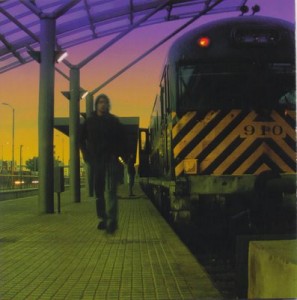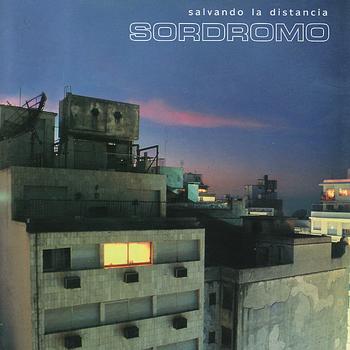
Sordromo’s fourth (and valedictory) album, “Los Amigos Invisibles” [“The Invisible Friends”] contains some of their best music together, but also a number of compositions that sound like nothing but rehashes of songs they had previously offered up. These compositions do not dominate the album in any sense, but they speak of a strained creative process, and upon listening to the album today it becomes evident why Rodrigo Gómez left the band shortly after the album had been issued.
To shunt the negative songs out of the way once and for all: “Lejos De Casa” [Far Away From Home] derives its melody and tonal structure from the song “Desnorteados” from the previous album, only that this time it lacks all punch. “Tanto Control” [So Much Control] and “Llamame” [Call Me] are clear examples of volume that tries to convey sentiment and that only ends up conveying patchiness. “Nota Para Un Viaje” [Note For A Travel] is no much better, but it is placed right before the first truly good composition of the album (the title track), and there is a thematic bond at play that makes it more palatable.
But the one song that can’t be stomached no matter how much you try is “Un Secreto” [A Secret], where Sordromo apes the brit sound of bands like Astroboy. This song alone tarnishes the first side of the album irrevocably – and most of the compositions I criticized above were already segregated there to begin with.
Still, it is on the first side of “Los Amigos Invisibles” where we find one of Sordromo’s most memorable hits, “Lucerito” (a tale of broken farewells and reconstituted memories). The song has really exciting dynamics, and the breaks are as good as the ones found on “2 + 2= 3”, where the drums virtually jump from the speakers and run over you. And the first side also hosts the angsty “El Filo Del Tiempo” [The Edge Of Time], a song that anticipates the hat trick that will close the album. “La Calma Y La Tormenta” [The Calm And The Storm], “A Punto De Equivocarme” [Just About To Make A Mistake] and “Inevitablemente” [Inevitably].
The three songs are linked by the despondency of the lyrics, and in “A Punto De Equivocarme” [Just About To Make A Mistake] Rodrigo’s voice sounds as if he were about to break down at any moment. It is a song in which emotions strafe the listener, and not a single bullet misses the target.
It works perfectly as the prelude to “Inevitablemente” [Inevitably], of course. The song is rendered solely by Rodrigo (he sings and plays the acoustic guitar), and his voice sounds bitten, as if after the previous caterwaul of emotions he has finally wiped the tears away, but tearing a bit of skin in the process. The song makes me think a lot of The Smiths’ final song, “I Won’t Share You”. Similar circumstances (creative differences), same message (it was good until it lasted, but that was it). Continue reading

